My journey to the Dalai Lama
Posted by Skyler
Maps has been writing about his 'journey with the Dalai Lama', but his understanding of Buddhist philosophy and teaching is limited to twenty pages of one book. My own understanding of Buddhism isn’t extensive either, but I would like to write about my experience of living and travelling in the Buddhist regions of Northern India in 1995. The quotes in this piece are from one of the friends who shared that amazing journey with me.
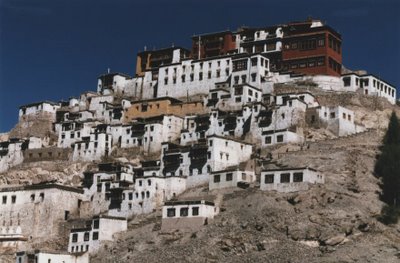 At 19, shortly after completing high school, I set off with two of my friends on a four month trip to India. We didn’t have any definite plans or itinerary - only a flight into Delhi and the rough plan to head north to Himachel Pradesh. Nothing in India is ever predictable; the only thing to expect is the unexpected. So, armed with our travel bible the Lonely Planet, we embarked on our adventure.
At 19, shortly after completing high school, I set off with two of my friends on a four month trip to India. We didn’t have any definite plans or itinerary - only a flight into Delhi and the rough plan to head north to Himachel Pradesh. Nothing in India is ever predictable; the only thing to expect is the unexpected. So, armed with our travel bible the Lonely Planet, we embarked on our adventure.
Our trip began in true Indian Style - we arrived two days late in Delhi, in the middle of the night, tired and bewildered. It was hard to adjust to the onslaught of touts, heat and poverty. I remember how on that first night one of my friends turned to me as we drifted of to sleep and in a tearful voice said, “I’ll give it three weeks, then I’m going home.”

"Arriving in Delhi was a real culture shock, so many people with so little awareness of personal space. People trying to sell you things, crowding you, touching you, and not leaving you alone when all you wanted was to find a hotel room and sleep! But coming back to Delhi after a few months of travel around India was different. I enjoyed the hustle and bustle, the people, the smells, the food and the shopping."
We decided to get out of Delhi as quickly as possible and head north to the Himalayan foothills, to give ourselves time to relax and assimilate the sensory overload that is India. We travelled by train and bus to McLeod Ganj (near Dharamsala), the town in the foothills of the Himalayas which houses the Dalai Lama and his Tibetan Government in Exile. McLeod Ganj was a relief from the heat and crowds of Delhi. I remember spending hours lying on the roof of our guest house watching the monkeys play in the trees, and gazing out over the plains that seemed to stretch out for miles below us. I felt safe and happy up there; it was a great way to relax and start my love affair with India.
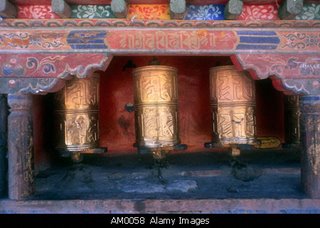
"McCleod Ganj was like a little oasis of peace. The Tibetan refugee people living there were so welcoming and humble. It almost felt like they too were visitors. They were making lives for themselves in India but were really hoping that it would not be long before they could return to Tibet."
McLeod Ganj is mainly Tibetan and the town is a mecca for Western travellers and Buddhists from all over the world. I remember circumnavigating the Buddhist temple by the Dalai Lama’s residence and coming across wandering cows – an unexpected sight for the newly-arrived traveller but a common one in India, where cows are considered sacred by Hindus. During my stay in Dharamsala I had the privilege of meeting Tenzin Gyatso, the 14th Dalai Lama. He had a profound effect on me, because he had a way of really connecting with each person he met and showing everyone genuine compassion (even though he was meeting over 500 people that day).
"I had the privilege to meet the Dalai Lama while we were in Dharamsala. I found the experience humbling. Waiting with the Tibetan people for our turn to meet the Dalai Lama gave me the opportunity to witness how dedicated they are to him, to Buddhism, and to a peaceful resolution and return to Tibet. I saw the genuine care and love with which the Dalai Lama greeted each visitor, including myself. That was special."
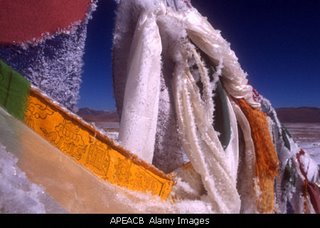
Tibetan culture is rich and colourful, full of celebration and a humour that belies the sufferings they have endured since the invasion of their country by China. It’s hard to imagine that people who have lost so much can still live life with a smile on their faces.
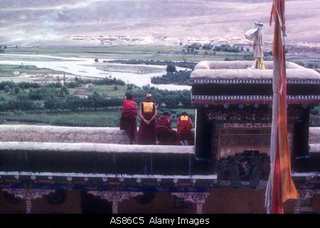 We travelled to many other parts of India, but the only place that had an impact comparable to Dharamsala was Ladakh, which is also located in the mountainous far north of the country. We flew in to the region from Delhi, because the roads were still closed by snow. This isn't an unusual situation - a plane is the only way into Ladakh for six months of the year.
We travelled to many other parts of India, but the only place that had an impact comparable to Dharamsala was Ladakh, which is also located in the mountainous far north of the country. We flew in to the region from Delhi, because the roads were still closed by snow. This isn't an unusual situation - a plane is the only way into Ladakh for six months of the year.
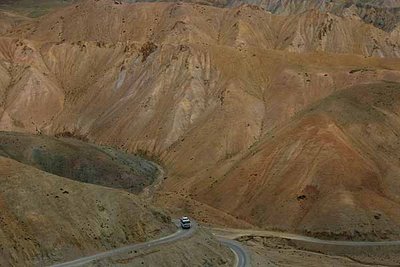
The largest town in Ladakh is Leh. It sits in one of the lowest points of the region, but is still about three thousand metres above sea level. I made the mistake of flying into Ladakh with the beginnings of bronchitis, and with the high altitude in Leh I promptly got worse and ended up on bed for two weeks. The foolishness of youth!
Ladakh ("land of high passes") is an autonomous state in Northern India, sandwiched between the Karakorum mountain range to the north and the Himalayas to the south. A majority of Ladakhis are Tibetan Buddhists and the majority of the remainder are Shia Muslims. Ladakh is a high altitude desert as the Himalayas create a rain shadow, denying entry to monsoon clouds. The main source of water is the winter snowfall on the mountains. Most of the region looks like a moonscape.
While we were in Ladakh we travelled over the highest motorable road in the world. It was unsealed, full of potholes, and clung to the edges of immense cliffs. Looking down one of those cliffs, I was disconcerted to see the wrecjakge of numerous vehicles far below.
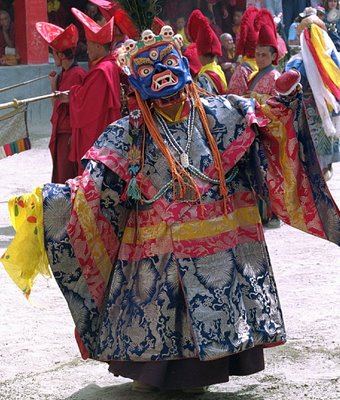
"We stayed in Ladakh many more weeks than we had planed to. But I loved the life there. Buddhists, Hindus and Muslims living peacefully side by side. We went to festivals from all these religions and witnessed them in the street."
In Ladakh we visited a small village called Dha, which had only been open to Westerners for six months. We needed a permit to get in and could only stay for two days. Some of the villagers had auburn hair and green eyes, which marked them out as desendants of the army of Alexander the Great. We were made very welcome in Dha, and all over Ladakh.
Ladakh felt like a crossroads between very different worlds: a traditional travel route, it still plays host to traders from India, China, Tibet, Nepal, Kashmir and Pakistan. The borders of the state are continually contested and there is a big Indian military presence. We found this useful, because we were able to hitch rides to otherwise inaccessible areas on army and goods trucks.
Anyone interested in Ladakh and in Tibetan Buddhism should read Andrew Harvey’s book A Journey in Ladakh. Harvey journeyed to the region in 1981, searching for the wisdom within the ancient Buddhist traditions.
Maps has been writing about his 'journey with the Dalai Lama', but his understanding of Buddhist philosophy and teaching is limited to twenty pages of one book. My own understanding of Buddhism isn’t extensive either, but I would like to write about my experience of living and travelling in the Buddhist regions of Northern India in 1995. The quotes in this piece are from one of the friends who shared that amazing journey with me.
 At 19, shortly after completing high school, I set off with two of my friends on a four month trip to India. We didn’t have any definite plans or itinerary - only a flight into Delhi and the rough plan to head north to Himachel Pradesh. Nothing in India is ever predictable; the only thing to expect is the unexpected. So, armed with our travel bible the Lonely Planet, we embarked on our adventure.
At 19, shortly after completing high school, I set off with two of my friends on a four month trip to India. We didn’t have any definite plans or itinerary - only a flight into Delhi and the rough plan to head north to Himachel Pradesh. Nothing in India is ever predictable; the only thing to expect is the unexpected. So, armed with our travel bible the Lonely Planet, we embarked on our adventure.Our trip began in true Indian Style - we arrived two days late in Delhi, in the middle of the night, tired and bewildered. It was hard to adjust to the onslaught of touts, heat and poverty. I remember how on that first night one of my friends turned to me as we drifted of to sleep and in a tearful voice said, “I’ll give it three weeks, then I’m going home.”

"Arriving in Delhi was a real culture shock, so many people with so little awareness of personal space. People trying to sell you things, crowding you, touching you, and not leaving you alone when all you wanted was to find a hotel room and sleep! But coming back to Delhi after a few months of travel around India was different. I enjoyed the hustle and bustle, the people, the smells, the food and the shopping."
We decided to get out of Delhi as quickly as possible and head north to the Himalayan foothills, to give ourselves time to relax and assimilate the sensory overload that is India. We travelled by train and bus to McLeod Ganj (near Dharamsala), the town in the foothills of the Himalayas which houses the Dalai Lama and his Tibetan Government in Exile. McLeod Ganj was a relief from the heat and crowds of Delhi. I remember spending hours lying on the roof of our guest house watching the monkeys play in the trees, and gazing out over the plains that seemed to stretch out for miles below us. I felt safe and happy up there; it was a great way to relax and start my love affair with India.

"McCleod Ganj was like a little oasis of peace. The Tibetan refugee people living there were so welcoming and humble. It almost felt like they too were visitors. They were making lives for themselves in India but were really hoping that it would not be long before they could return to Tibet."
McLeod Ganj is mainly Tibetan and the town is a mecca for Western travellers and Buddhists from all over the world. I remember circumnavigating the Buddhist temple by the Dalai Lama’s residence and coming across wandering cows – an unexpected sight for the newly-arrived traveller but a common one in India, where cows are considered sacred by Hindus. During my stay in Dharamsala I had the privilege of meeting Tenzin Gyatso, the 14th Dalai Lama. He had a profound effect on me, because he had a way of really connecting with each person he met and showing everyone genuine compassion (even though he was meeting over 500 people that day).
"I had the privilege to meet the Dalai Lama while we were in Dharamsala. I found the experience humbling. Waiting with the Tibetan people for our turn to meet the Dalai Lama gave me the opportunity to witness how dedicated they are to him, to Buddhism, and to a peaceful resolution and return to Tibet. I saw the genuine care and love with which the Dalai Lama greeted each visitor, including myself. That was special."

Tibetan culture is rich and colourful, full of celebration and a humour that belies the sufferings they have endured since the invasion of their country by China. It’s hard to imagine that people who have lost so much can still live life with a smile on their faces.
 We travelled to many other parts of India, but the only place that had an impact comparable to Dharamsala was Ladakh, which is also located in the mountainous far north of the country. We flew in to the region from Delhi, because the roads were still closed by snow. This isn't an unusual situation - a plane is the only way into Ladakh for six months of the year.
We travelled to many other parts of India, but the only place that had an impact comparable to Dharamsala was Ladakh, which is also located in the mountainous far north of the country. We flew in to the region from Delhi, because the roads were still closed by snow. This isn't an unusual situation - a plane is the only way into Ladakh for six months of the year.
The largest town in Ladakh is Leh. It sits in one of the lowest points of the region, but is still about three thousand metres above sea level. I made the mistake of flying into Ladakh with the beginnings of bronchitis, and with the high altitude in Leh I promptly got worse and ended up on bed for two weeks. The foolishness of youth!
Ladakh ("land of high passes") is an autonomous state in Northern India, sandwiched between the Karakorum mountain range to the north and the Himalayas to the south. A majority of Ladakhis are Tibetan Buddhists and the majority of the remainder are Shia Muslims. Ladakh is a high altitude desert as the Himalayas create a rain shadow, denying entry to monsoon clouds. The main source of water is the winter snowfall on the mountains. Most of the region looks like a moonscape.
While we were in Ladakh we travelled over the highest motorable road in the world. It was unsealed, full of potholes, and clung to the edges of immense cliffs. Looking down one of those cliffs, I was disconcerted to see the wrecjakge of numerous vehicles far below.

"We stayed in Ladakh many more weeks than we had planed to. But I loved the life there. Buddhists, Hindus and Muslims living peacefully side by side. We went to festivals from all these religions and witnessed them in the street."
In Ladakh we visited a small village called Dha, which had only been open to Westerners for six months. We needed a permit to get in and could only stay for two days. Some of the villagers had auburn hair and green eyes, which marked them out as desendants of the army of Alexander the Great. We were made very welcome in Dha, and all over Ladakh.
Ladakh felt like a crossroads between very different worlds: a traditional travel route, it still plays host to traders from India, China, Tibet, Nepal, Kashmir and Pakistan. The borders of the state are continually contested and there is a big Indian military presence. We found this useful, because we were able to hitch rides to otherwise inaccessible areas on army and goods trucks.
Anyone interested in Ladakh and in Tibetan Buddhism should read Andrew Harvey’s book A Journey in Ladakh. Harvey journeyed to the region in 1981, searching for the wisdom within the ancient Buddhist traditions.

6 Comments:
You can read an interesting article by Yoginder Sikand on countercurrents.org entitled:
'Muslim-Buddhist Clashes In Ladakh: The Politics Behind
The 'Religious' Conflict'
http://www.countercurrents.org/comm-sikand130206.htm
thank you for your valuable and useful information through the blog. I am appreciating with the way you shared the relevant, precious, and perfect information. Furthermore, I would like to also keep some sound knowledge about SEO Course in Noida . If you have interest in Digital Marketing Course so just visit our website and you will get complete Assistance related to Digital Marketing . Or Call On +91-844-747-0220
Certain courses in digital marketing focus on a particular area of the field like SEO or social marketing via social media. Other courses cover a wider variety of subjects like the topic of content marketing, or Google Analytics. Some digital marketing courses follow a mentor-led, method of learning that is based on community. In these courses you'll be working with an industry professional and create projects that can be used to demonstrate your new abilities.
I get pleasure from, cause I found just what I used to be having a look for.
You’ve ended my four day long hunt! God Bless you man. Have a nice day.
Thanks for a marvelous posting! I truly enjoyed reading it, yyou might be a great author.
Post a Comment
<< Home